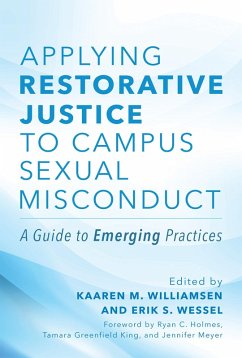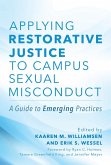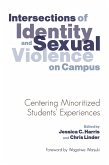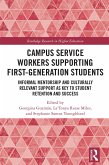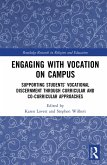Dieser Download kann aus rechtlichen Gründen nur mit Rechnungsadresse in A, B, BG, CY, CZ, D, DK, EW, E, FIN, F, GR, HR, H, IRL, I, LT, L, LR, M, NL, PL, P, R, S, SLO, SK ausgeliefert werden.
Ryan C. Holmes, Associate Vice President for Student Affairs and Dean of Students, University of Miami
"Applying Restorative Justice to Campus Sexual Misconduct serves as a much-needed resource for Title IX and student affairs professionals. With the growing demand from survivors for restorative justice options, it is vital for practitioners to understand and apply the practice effectively. Emphasizing the importance of thoughtful treatment of all parties involved, this book provides the expertise and guidance needed to navigate cases involving sexual misconduct on campus, ensuring that restorative justice is practiced with the utmost care and consideration."
Jennifer E. Henkle, Director, Sexual Violence Prevention and Response, NASPA
"Williamsen, Wessel, and colleagues explore a restorative justice approach's why, what, and how for campus-based sexual violence. They make a case for restorative justice practices as a resolution option that prioritizes survivors' healing, perpetrators' accountability, and individual and collective learning and change. I've seen too many times how a compliance-based traditional process can undermine its own intended outcomes. They explore case examples, offer guidance and direction, and share wisdom and insights learned through integrated practice, deep reflection, and social justice-oriented praxis."
Keith E. Edwards, sexual violence prevention educator and author of Unmasking: Toward Authentic Masculinity
"This book, written by school administrators and restorative justice practitioners, is a comprehensive guide to the use of restorative justice for campus sexual misconduct. Incorporating the latest social science research, the authors offer detailed advice about restorative justice practice, provide compelling case studies, and describe program development. This is a must-read for school administrators, school-based restorative justice facilitators, and for all who seek a better way of responding to sexual harm."
Donna Coker, Professor of Law, University of Miami School of Law
"This is the go-to volume for all things related to Restorative Justice and Sexual Misconduct on college campuses. Williamsen and Wessel have curated a volume that is essential, both for those who are immersed in restorative practices and sexual misconduct and for those interested in learning more. This book is a must read."
Alissa R. Ackerman, Associate Professor, Criminal Justice Program Coordinator, California State University, Fullerton
"Restoring relationships and communities after a harmful experience is critical work for educators and leaders. This book provides guidance for those wishing to use restorative justice informed approaches (RJIA) to advance equity, transparency, inclusivity and fairness in their processes. While focused on responses to sexual misconduct, it is broadly useful for all of us who want to think as partners rather than as adversaries in creating human-centered educational spaces in which all of us can thrive."
Rebecca Ropers, Professor of Higher Education and Vice Provost for Faculty and Academic Affairs, University of Minnesota

